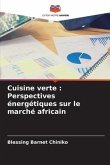In Sub-Saharan African countries, more than 88% of the total population relies primarily on traditional biomass, such as fuel wood, charcoal and agricultural waste as energy source for cooking. However, appraisal of recent researches have demonstrated that the depending primarily on this traditional biomass has led to environmental degradations, health related issues in women and children and also, local climate change. In that vein, Solar cooking, improved biomass cooking stoves, biogas generation, piped natural gas (PNG), electricity based cooking and liquefied petroleum gas (LPG) have been developed as the most recent sustainable solutions to address the attendant challenges of traditional biomass. Therefore, this book reviews the challenges associated with solar cooking, improved biomass cooking stoves and biogas generation in Africa. The book argues that the existing proffered solutions are not operational in developing countries like Nigeria, Uganda, Rwanda and Cameroon dueto illiteracy, incidence of poverty, unavailability of materials and skilled labor, cultural unacceptance and unavailability of intermittent sources.
Bitte wählen Sie Ihr Anliegen aus.
Rechnungen
Retourenschein anfordern
Bestellstatus
Storno








